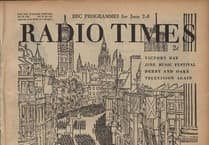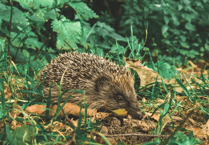In the summer of 1944 Kathleen Oates - a Wren assigned to the Women's Royal Naval Service during the Second World War - was transferred to the Isle of Man. During her time on the island, she wrote dozens of letters home which provide a unique commentary on the operations at Ronaldsway and what life was like on the Isle of Man 80 years ago. Her daughter, CHRISTINE SMITH, pores through her mother’s letters as part of a series of columns based on Kathleen Oates’s writing...
Eighty years ago this week, consumer goods were on the mind of Wren Kathleen Oates – along with many others in the British Isles, as it dawned on everyone that things would not quickly bounce back to how they had been pre-war. Kathleen’s father in a letter to her earlier that month, expressed what many were experiencing: ‘last week we were warned about clothing, this week it’s food – no further variety and no extras. Peace is going to be as hard to put up with as war conditions – for a long time to come’.
As March 24 was her day off, she headed for Douglas early on Saturday morning, in search of a blouse, ‘before the Navy crowd went in on the 1:30 afternoon train’. It was not an easy shopping session, but she emerged with a result. ‘I had the utmost difficulty in getting a blouse – I didn’t realise they were so scarce. Eventually, I saw a pretty yellow blouse in a hat shop, where I didn’t imagine they’d accept chits [Chits allowed those in the Forces to buy more than the civilian clothing coupon allowance]. However, I hopefully enquired and was relieved to hear the answer. It cost 17/11d, which I didn’t think was too bad, considering a decent blouse seems so difficult to get - as you say Pop, the clothing situation will become worse before better!’ Replying later that week, mum Elsie commented, ‘Glad to hear that you have bought a blouse and skirt – the clothing problem is acute everywhere’.
Mission accomplished, Kathleen returned to Castletown Camp on the 12:05 train, in time for lunch in the canteen with friends Cynthia and the Janes.
Thinking of her family’s requirements, she assured them that advanced planning where they were concerned, was also in operation. ‘You should have received a parcel from me by now with some salad cream and floor polish. Also, hair shampoo which Dorothy likes. I thought I’d better get the cream before salads really come in – all the locals will be buying it then, I imagine’. In a later letter that week, she reported that she had purchased a pen for Granny and would bring it with her when she came on leave – it seemed that pens in Leicester were still hard to come by, as this was the third pen she had bought for the family on the Isle of Man since arriving the previous August.
Kathleen opted to miss Saturday evening’s cinema outing with her friends and stayed reading by the canteen fire, where she got talking with the only other girl there – a Land Girl, a member of the Women's Land Army, replacing male agricultural workers who were now at the Front. She was from southern Ireland and had been living locally for some time. ‘We had quite an interesting conversation. She’d been in the Isle of Man before the war as well as now for eight years, and she didn’t like the people at all. She found them very unfriendly on the whole.’ If this was anti-Irish sentiment, there was possibly quite as much across, but Kathleen didn’t mention this; she reported the encounter to her family without commenting. Certainly, her letters never indicated that the Manx were anything less than pleasant to deal with.
Exploring the Isle of Man and enjoying its beauty had not been cast aside for shopping. On March 27, the weather was ‘glorious - so hot, that most of the time I was only wearing my blouse and skirt – no cardigan or Mac’, and Kathleen and a friend cycled to Wendy’s ‘then walked and climbed up the hills behind Port Saint Mary to Cregneash and down again to the Calf of Man. There was a lovely view from the top; one could see the sea through three different bays: Port Saint Mary, Port Erin and Fleshwick’. On returning to Wendy’s, they were told to Kathleen’s amusement, that there were only eggs left on the menu – an item which was normally a wartime luxury – ‘I suppose one can get tired of eggs in time!’. Decades later, the wartime availability of eggs on the Isle of Man was something that Kathleen recalled, when other memories were less distinct.
A second letter home that week told of another outing on March 29. ‘In the evening it cleared up miraculously and the sun shone for a while and we had a large golden moon. I went for a cycle ride on my own between 7:30 and 9pm – it was really lovely. Everywhere was silent as night flying had not yet started; I could hear the birds clearly. The sky was grey with soft clouds and while it was still light, the moon was really golden, matching the gorse bushes.’
The progress of the war in Europe was only referred to in the briefest of mentions; at Ronaldsway, the Pacific war would have been equally top of mind. Answering her father’s comments on the Allied progress, she said that she saw the newspaper in the canteen, but ‘I gather we’ve made successful crossings of the Rhine and that’s about all I know’.
Victory in Europe did not appear to affect her position on the Isle of Man; letters she received from family seemed to focus more on the near future. On March 30, Kathleen’s Aunty Eva wrote to her from Yorkshire that she was ‘looking forward to summer and the end of the war - it seems as though the end is very near - isn’t the news wonderful now? Won’t it be a great day when peace is declared?’.



.JPG?width=209&height=140&crop=209:145,smart&quality=75)
